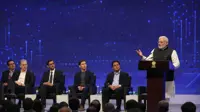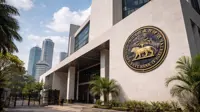The Goods and Services Tax (GST) Council meeting today is expected to review the various tax slabs with a view to rationalise rates, even as the revenue department is looking to boost tax collection.
As part of the steps to improve tax collections, the government may raise GST rates on lotteries, which currently contend with two different rates. Those run by state governments attract 12 per cent GST while those authorised by them and sold outside the state are taxed at 28 per cent.
The government is also contemplating a temporary cess of 2 per cent on certain goods, especially those falling in the 5 per cent and 18 per cent slabs, in order to make up for the revenue shortfall.
At the same time the GST Council is looking to balance revenue collections between states and the centre besides ironing out problems faced by a few industries, sources said.
With the possibility of fiscal slippage, the finance ministry has asked tax officials to step up efforts to boost the tax collection during the remaining period of the current fiscal ending 31 March 2020.
The GST Council may clarify rates on long-term leases, exempting those of 30 years or more if provided by a state, or if the central government has a stake of at least 20 per cent. If approved, this will benefit manufacturing, realty and hospitality companies, experts said. Several companies had taken the government to court over 18 per cent GST on long-term lease transactions. A GST rate of 5 per cent will be levied on long-term leases if the plot is owned by a private individual, according to the GST agenda note, says a report in The Economic Times.
As per official data, net direct tax collection for the period from April to November was Rs5,56,000 crore, against Rs5,47,000 crore while net GST collection (CGST + IGST+ Compensation cess) was Rs3,98,000 crore against Rs5,82,000 crore during last fiscal.
As things stand, there is a strong possibility that the fiscal deficit might widen at least 50 basis points more than the budget estimate of 3.3 per cent of GDP.
Reports, meanwhile said revenue secretary Ajay Bhushan Pandey had a meeting with all the members of the Central Board of Indirect Taxes and Customs, the Central Board of Direct Taxes, Principal Chief Commissioners and Chief Commissioners and other senior officers, during which he has asked them to set a target of Rs1,10,000 for monthly collection of GST, besides the target of Rs1.25 lakh crore for one of these four months.
Besides, the revenue department is reported to be taking measures to augment revenue collections for the next four months and has asked senior tax officials to work towards achieving tax targets both for direct and indirect taxes.
While the fall in direct tax collections could be attributed to the corporate taxes relief worth Rs1,45,000 crore through the slashing of corporate tax rate, the government is not ready to take it as an excuse for lower direct tax collection.
Tax officials have been asked to check if any taxpayer has missed out on sharing the correct tax information.
GST officials have been told to make sure if the GSTR-1 and GSTR-3B are filed by the taxpayers, failing which they have been asked to take strict action against them. These include blocking of e-way bill, blocking input tax credits and cancellation of registration.
The industry and traders have been advised to ask their suppliers to file their GST returns, including GSTR-1, in a timely manner, failing which buyers may not able to get input tax credits on those supplies for which tax has not been paid by their suppliers.




















